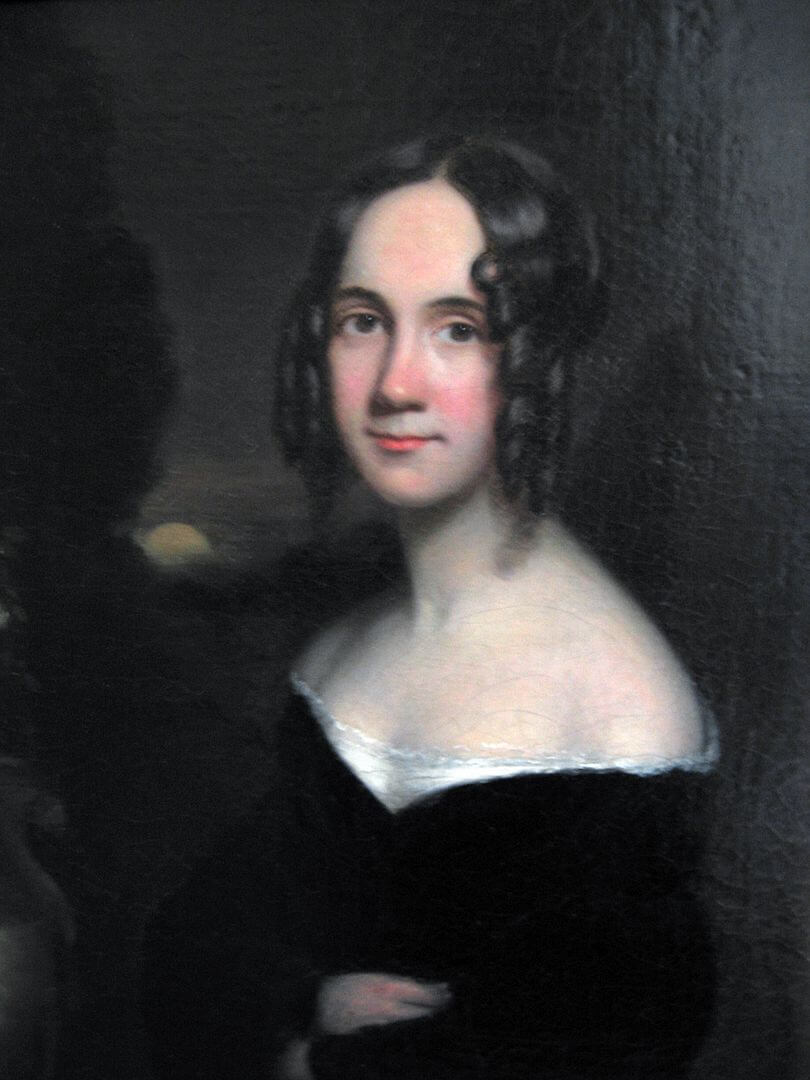Sarah Josepha Buell Hale
Sarah Josepha Hale was one of the most successful women in writing and publishing in nineteenth-century America, and her letters and editorials were instrumental to the creation of Thanksgiving as a national holiday. Hale is connected to the old West End because one of her poems, “Mary’s Lamb,” was set to music by Lowell Mason at the Bowdoin School.
Sarah Josepha Buell was born in 1788 in New Hampshire to Martha Whittlesay Buell and Captain Gordon Buell, an officer during the Revolutionary War. Because Sarah’s parents believed that she deserved an education, she studied at home reading many books while her brother, Horatio Buell, attended Dartmouth College. Sarah Josepha Buell eventually became a teacher and married David Hale, a lawyer and Freemason, in 1813. David Hale, too, supported Sarah’s lifelong learning, and she started a literary club among friends while married. In that club, Sarah Josepha Hale began to write. The two had five children together, but David died of pnuemonia in 1822. After he died, David’s Freemason lodge provided the financial support for Sarah Josepha Hale and her sister-in-law, Hannah Hale, to start a business in millinery (making and selling women’s hats). Sarah continued with her writing, and with the Freemasons’ backing she published The Genius of Oblivion and Other Original Poems in 1823. Hale’s earnings from this book allowed her to leave millinery and write full-time, finding more success with Northwood; a tale of New England (1827), a book where the woman protagonist refused to move to Charleston, South Carolina to marry a man who owned slaves. The book elevated Sarah Josepha Hale’s literary reputation and led Reverend John Lauris Blake to offer her a job as editor for his new women’s magazine in Boston called Ladies’ Magazine and Literary Gazette.
Hale moved to Boston in 1827, and her connection to the old West End is based upon her friendship with Lowell Mason, a music teacher and prolific composer of American church music who taught at the Bowdoin School in 1839. The Bowdoin School, located on Derne Street until it was relocated to the Masonic Lodge on Tremont Street in 1847, was one of the first schools to provide a high school education to girls. Hale wrote the poem “Mary’s Lamb,” published in 1830, which Mason composed music for. The result was the iconic song “Mary Had a Little Lamb,” which Thomas Edison recorded on a phonograph in 1877. Because Mason taught music, the song that Hale wrote the lyrics to was likely introduced to Bowdoin students prior to Edison more widely popularizing it.
Hale continued to edit the periodical re-named to American Ladies’ Magazine in 1834. Her publication, which had 150,000 readers, gave an early, successful platform to writers such as Harriet Beecher Stowe, Edgar Allan Poe, Ralph Waldo Emerson, Lydia Maria Child, and Susan B. Anthony. Hale turned down an offer by Louis Godey in 1836 to edit Lady’s Book, because she wanted to continue with her own publication in Boston. Godey proceeded to buy up her magazine, combine it with his, and allow Hale to stay in Boston to edit Godey’s Lady Book from 1837 to 1841. In 1841, Hale moved to Philadelphia, Pennsylvania, but she continued to edit Godey’s Lady Book until the magazine was bought by Frank Munsey in 1877. As a supporter and campaigner for women’s causes, Hale did not agree with suffrage but supported women’s education, particularly with her involvement in the founding of Vassar College as a woman’s school.
Sarah Josepha Hale is most famous for campaigning for the recognition of Thanksgiving as a national holiday. Not only did she comment on the importance of Thanksgiving in Northwood, she also wrote editorials for her position in Godey’s Lady Book and began a letter-writing campaign to Presidents, governors, and members of Congress through the 1840s. Sarah Josepha Hale wrote a letter to President Abraham Lincoln on September 28, 1863 that proposed Thanksgiving as a “National and fixed Union Festival.” Lincoln agreed with Hale and issued his proclamation establishing the last Thursday of November as Thanksgiving. His rationale was that during the Civil War, the nation needed a day of thanks.
Hale died in 1879 at ninety-one years old. Thanksgiving would since be federally designated for every fourth Thursday of November (when some Novembers have five Thursdays) after President Franklin Roosevelt signed a joint resolution by Congress to that effect on December 26, 1941.
Article by Adam Tomasi
Source: Hope Greenberg (author of Godey’s Lady Book Collection), Boston Women’s Heritage Trail, Northwood; a tale of New England (page 212); TIME Magazine; National Archives; West End Museum; Public Women, Private Lives (Omeka site)








